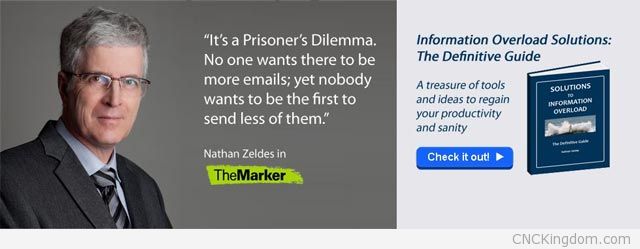Nathan Zeldes, Thinker | Speaker | Problem Solver (Israel)
Nathan is one of those guys where the Universe seems to go around him instead of the other way around… as a result, what he’s achieved is difficult for me to put into words in any kind of condensed form… his answers are both insightful and powerful.
Key takeaways from this interview:
- A basic requirement is to have a culture that empowers employees to experiment, push the boundaries and occasionally fail without fear of punishment.
- A carefully crafted telecommuting program benefits employees, employers and customers alike.
- Try a no-email DAY! I “heard” of this but never actually thought it was possible… I’m very much one of those guys who checks e-mails far too often!
You can reach out to Nathan by visiting his website http://www.nathanzeldes.com.
Nathan, you have an incredible record of accomplishment from being among the first to address information overload at the corporate level to teaching Social Media literacy classes at intel and being a lab officer in forensic sciences to founding/leading way too many endeavors. What is your secret towards accomplishing in one lifetime what would take others several?
 Well, living long helps!… Seriously, I guess I’ve had a knack for redefining my job whenever I’ve reached a plateau, whether by moving to another organization or by molding the job definition to take advantage of new and serendipitous opportunities. I find that in almost any job you can add zest and innovate if you keep an open eye for the available change opportunities – or create your own as needed.
Well, living long helps!… Seriously, I guess I’ve had a knack for redefining my job whenever I’ve reached a plateau, whether by moving to another organization or by molding the job definition to take advantage of new and serendipitous opportunities. I find that in almost any job you can add zest and innovate if you keep an open eye for the available change opportunities – or create your own as needed.
Can you expand on your employee innovation systems? What are they, how do they work and do you have some case studies that you can share as to their results?
The key word is Systems; you (as a manager) want to have a system that will foster innovation regardless of individual employees’ tendencies. A basic requirement is to have a culture that empowers employees to experiment, push the boundaries and occasionally fail without fear of punishment. Once you have that in place, you still need a methodology for nudging the innovators towards practical results.
Along my career I was involved in a number of programs where we encouraged people to submit innovative ideas and rewarded the best of these; in small groups you can do it manually, in larger ones you can benefit from a proper web-based system for submitting and judging ideas.
At Intel IT we also had Innovation Centers where we showcased the innovative practices and tools we’ve adopted for people from within and outside the company. See more on this at http://www.nathanzeldes.com/wp-content/uploads/2013/12/Culture-of-Innovation.pdf.
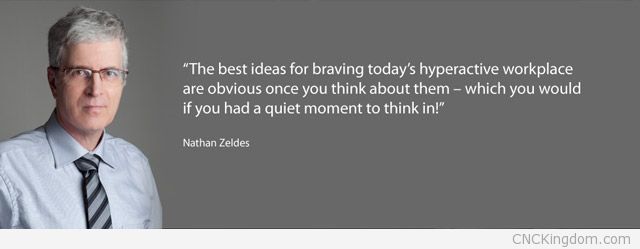
Work/life balance is extremely difficult for entrepreneurs – I’m so passionate about what I do that hours just seem to flow especially when I’m designing CNC projects… it’s almost like a waking dream where hours feels like minutes and disruptions are just as jarring. I realize I’m lucky to have found my passion in life but it’s a struggle to balance that with others around me as I’m just so comfortable and fulfilled “in my own world”. How do you help companies deal with people such as myself or entrepreneurs working on their startup so that they can still have a family life outside of work especially when they can be relocated at a moments notice to other divisions in far away lands?
Relocation aside (I’ve done it, but hardly “at a moment’s notice”), there is certainly a serious problem with Work/Life balance, and unless people find a way to allocate time to their loved ones and to themselves (in their non-work personas) they will come to regret it sooner or later.
Entrepreneurs in early startup mode may be beyond hope; they go into crash mode for a few years and there’s no stopping them (but see this post by entrepreneur Toby Ruckert: http://www.nathanzeldes.com/blog/2013/09/startup-burnout-can/). Perhaps the reward they aim at mandates this – I always found Paul Graham’s analysis of this at http://paulgraham.com/wealth.html very thought provoking.
It’s sadder to see such self-abuse by cube dwellers in large organizations, where we’re talking about a sustained lifelong behavior. Information Overload has exacerbated this issue considerably for everyone, and one of my reasons for helping organizations fight it is the desire to allow employees to see their children! For advice on how to handle IO in one’s work and life I can refer the reader to my blog (http://www.nathanzeldes.com/blog/) – it’s my favorite subject.
Another aspect of W/LB has to do with flexible work arrangements. When I was at Intel I initiated the corporation’s Telecommuting program, which allowed 1-2 days a week at home (more is usually detrimental in a company environment) with suitable support systems. We studied the outcomes carefully and found that a carefully crafted telecommuting program benefits employees, employers and customers alike; I share some observations at http://www.nathanzeldes.com/wp-content/uploads/2012/11/The-makings-of-a-telecommuting-program.pdf .
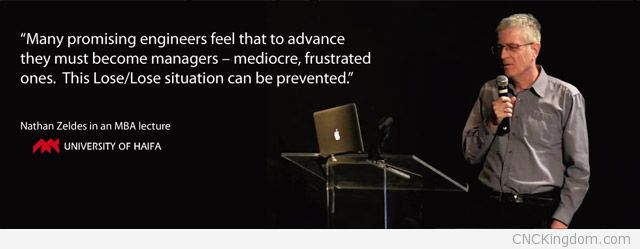
You enjoyed an incredible career at Intel (1982 – 2008) and I was wondering after being part of a dynamic and fast paced organization for almost as long as I’ve been alive, what it was like to leave and start your own business helping other companies with finding solutions to staffing and technological issues? What do you miss about your former career?
Actually, I’m very glad I had my career at Intel, which had a huge positive impact on my skills and personality, but I don’t miss it. It was time to move on – you shouldn’t spend your entire life in a cloth covered cube – and going solo made the most sense as a next step.
My initial intent was to advise other companies in the same area I worked on at Intel, knowledge worker effectiveness; I do this, but I found there are many other things I love to do that I have the freedom to pursue, notably lecturing, mentoring students, helping startups, even curating exhibitions at science museums. Working for oneself involves an agility that no corporate environment can provide, and working for many diverse companies is very interesting!
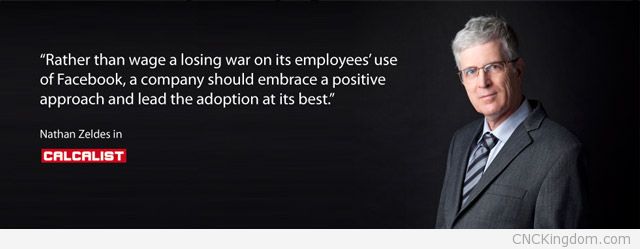
What are some simple steps an organization can do to reduce the amount of information that is both sent from and received by other departments and companies? I know for myself, I’ve steadily had to increase my threshold for correspondence – I always ask myself “does this person REALLY need this message or can it wait or is it filler?”
In a sense, taming info overload at an organizational level (rather than an individual one) is never simple. The flood of messages being sent is usually a symptom of deeper problems in the organizational culture, such as lack of trust, the need for CYA, organizational politics… and to solve those you need a culture modification effort, which is quite a challenge.
There are many solutions that can mitigate the overload, but unless you go for the culture you will see only partial relief. A key thing to attempt is to get people out of the mode where they feel compelled to check their email, and reply to it, every few minutes. Some companies define “Quiet Time” periods where email is not sent at all; some go with “No Email Day” setups; one global company is actually working to replace internal email altogether.
As an individual, the most valuable tip I can share is to simply turn off all those “You’ve got mail” alerts and only check email proactively 2-3 times a day in predefined time slots. Try it! For more solutions – over 160 of them! – You can check out my just-published guide at http://www.nathanzeldes.com/guide.
Did you ever envision the career you’ve enjoyed thus far when you first graduated from Hebrew University with a M.Sc. (Applied Physics) in 1977? What is some advice you really wished you could have given to yourself back then that would have saved you lots of grief and maybe would have changed the outcome and decisions you made in your life?
Wow! Now that’s a question… I admit I did not envision then that I’d be interviewing as an expert about Info Overload on a CNC blog (there were neither blogs, nor CNC, nor Email, nor overload back in 1977). Much of my career involved unforeseeable twists and turns.
On the whole I’m pretty pleased with my career so far, and the early choices I made turned out quite well for me. If I could go back, perhaps I would have advised myself to leave the cube farm a few years earlier; there is that tendency to linger in the comfort of a steady job, and I started on my current path a bit late.
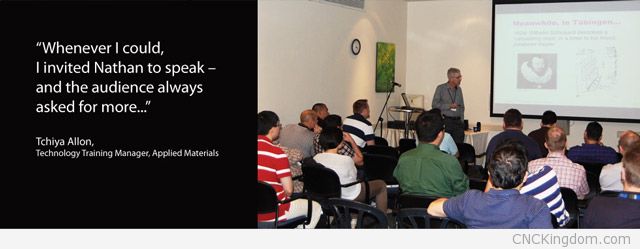
7- Anything else you’d like to add Nathan?
Well – be sure to keep an iPhone around to show your grandchildren. They will find it as alien as today’s kids find my collection of slide rules. Technology changes at breakneck speed these days, and as a geek I am really grateful for the good luck I have of living through such interesting times. Who knows what will happen by the time you reach my present age?
I am happy to announce the completion of a major effort I’ve been doing. I just released last week my first eBook, “Solutions to Information Overload: The Definitive Guide”. Take a peek at http://www.nathanzeldes.com/guide. I really think it can be of great use to people who overwork themselves.

